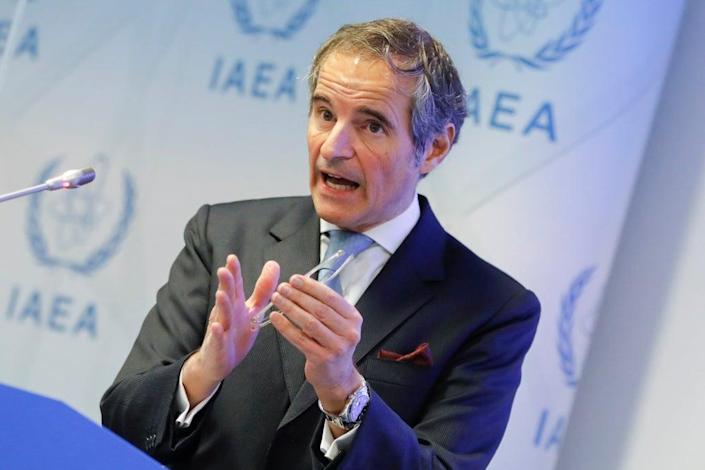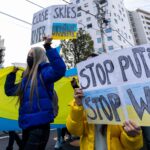
The head of the world’s nuclear watchdog has offered to fly to Chernobyl and meet with Russian and Ukrainian officials to try and avert a catastrophe engulfing Europe.
A day after Russian forces struck the Zaporizhzhia nuclear power plant, sparking massive concerns about the potential for disaster and leading Joe Biden to hold late night call with Ukraine’s leader, International Atomic Energy Agency (IAEA) chief Rafael Grossi, offered to try and broker a deal between the two sides.
Grossi, 61, said the present situation was unprecedented in that there was no history of a nuclear facility being struck in war time, something prohibited by the Geneva Conventions.
Adding to the complexity, both the Zaporizhzhia nuclear power plant, and the former facility at Chernobyl, which suffered a major meltdown in 1986, were both being run by Ukrainian scientists, while Russian troops had taken physical control of the locations and the surrounding areas.
He said: “For the time being it is purely Ukrainian staff running the operations there. What we have in this case as we speak … is in Chernobyl and in Zaporizhzhia we have effective control of the site in the hands of Russian military forces. I hope the distinction is clear.”
Speaking in Vienna on Friday, Mr Grossi outlined seven principles the agency pointed to in regard to the safety of nuclear plants, and said one of the principles – preserving the integrity to the physical premises – had been compromised.
“And we have to act in consequence. For us, it is time for action. We need to do something about this,” he said.
“I have indicated to both the Russian Federation and Ukraine my availability and disposition to travel to Chernobyl as soon as possible, so that these seven crucial pillars are never again compromised.”
He added: “I’m extremely concerned. This is something which is very, very fragile, very unstable as a situation. Right now, we have this normal abnormality, if I can put it like that.”
Grossi, an Argentine diplomat, said any visit to Ukraine must first wait until he returns from Tehran, where he was heading to try and help seal a new Iran Nuclear Deal, that unraveled after Donald Trump pulled the US from the multi-party arrangement in 2018.
In the early hours of Friday, as details of the attack on the plant at Zaporizhzhia emerged, Ukraine president Volodymyr Zelensky posted a grim video message.
“I address all Ukrainians, all Europeans, everyone who knows the word ‘Chernobyl,’ everyone who knows how many victims that explosion of a nuclear plant brought,” he said. “Russia wants to relive it and is already doing it.”
Chernobyl, whose suffered a major disaster on 26 April 1986 at the No 4 reactor, is considered to be the world’s worst non-military nuclear disaster in terms of contamination and clean-up costs. The site was captured last week by Russian forces on one of the first days of Russia’s invasion.
“It is impossible to say the Chernobyl nuclear power plant is safe after a totally pointless attack by the Russians,” Mykhailo Podolyakhe, an adviser to the Ukrainian presidential office told reporters after the incident
“This is one of the most serious threats in Europe today.”


Asked why he was suggesting meeting at Chernobyl, Grossi said there were technical things that IAEA staff could share with both sides. He also said the location was important to help make progress “diplomatically.”
He said he hoped the two sides could agree to commit not to do anything to endanger nuclear security in Ukraine.
Russia’s invasion of Ukraine is the first time war has broken out in a country with such an advanced and established nuclear power programme, the IAEA has said. Zaporizhzhia is the biggest of the country’s four operational nuclear power plants, together providing about half Ukraine’s electricity.
Protocol I to the 1949 Geneva Conventions restricts attacks against dams, dikes, and nuclear power stations, if “severe” civilian losses might result. These regulations were updated in 1977.
I’m traveling to #Tehran today for meetings with Iranian officials tomorrow to address outstanding questions in #Iran ????????. This is a critical time but a positive outcome for everyone is possible. pic.twitter.com/teZxLLEch2
— Rafael MarianoGrossi (@rafaelmgrossi) March 4, 2022
Prosecutors at the International Criminal Court in The Hague have already begun an investigation into possible war crimes carried out by Russian forces in Ukraine.
“This initiative of mine has nothing to do with the political aspects of this crisis. This is not my mandate. I am not the Security Council of the United Nations. I am not the Secretary General of the United Nations. I am not a self appointed mediator. It has nothing to do with that,” said Grossi.
“I want to be extremely clear about this. What we are talking about here is a framework under the aegis of the IAEA, whereby Ukraine and the forces that are present in this context of in the context of this military operation of the Russian Federation, can agree to a commitment to not to compromise these principles that I have mentioned.”
Grossi said both Ukraine and Russia were considering his proposal.
Asked why he thought he could make a difference on the ground, he replied: “It’s very important to be there. At the end of the day, there might be many different formats [for talks].
“What we want to indicate here is the disposition of the IAEA to move, to do something about what is going on, and not simply tweet, or say things from Vienna.”



